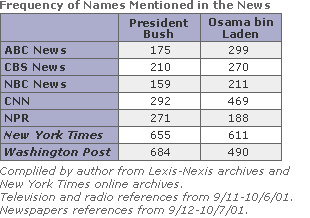 |
|
Following the events of September 11, Osama bin Laden basically became a media star. He was the number-one newsmaker for the American media. He probably held a similar place in the media of other countries as well. From September 11 to October 6—before the first U.S. military strikes against Afghanistan—Osama bin Laden was mentioned more frequently on the major television networks (ABC news, CBS news, NBC news, and CNN) than was the president of the United States. On National Public Radio (NPR) and in the New York Times, the president had a slight advantage over bin Laden for the frequency of mentions. President Bush's advantage was somewhat larger in the Washington Post, but still not particularly large.
These findings are even more surprising when you consider that President Bush addressed the public 54 times in those nearly four weeks. During the same period, bin Laden never spoke directly to the media. He released one videotape to Al-Jazeera, the Arab television network, which then fed the tape to the American networks. Without actively addressing the world, without granting interviews, without making daily statements, he basically received better coverage in American network television than the President of the United States, who took all of those actions.
Certainly the American media did not portray bin Laden as a sympathetic figure—just the opposite. But the tone of the coverage does not matter to a terrorist leader or a terrorist group. They do not care what kind of coverage they receive as long as they get the coverage. They don't want to be loved; they want to be feared. I think the media was very helpful to bin Laden in that respect of spreading fear.